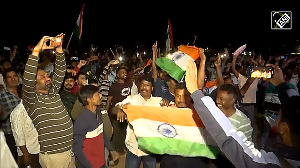Qatar's construction industry is rife with abuse of migrant workers who are "treated like cattle" and live in squalid accommodation exposed to overflowing sewage, Amnesty International said in a report on Sunday.
- 'FIFA should pick new 2022 World Cup host'
 The country will host the 2022 World Cup and Amnesty called on world soccer's governing body FIFA to work with the Qatari authorities to stamp out abuses of workers who mainly come from South Asia.
The country will host the 2022 World Cup and Amnesty called on world soccer's governing body FIFA to work with the Qatari authorities to stamp out abuses of workers who mainly come from South Asia.
"Our findings indicate an alarming level of exploitation in the construction sector in Qatar," said Amnesty secretary general Salil Shetty.
"FIFA has a duty to send a strong public message that it will not tolerate human rights abuses on construction projects related to the World Cup."
"It is simply inexcusable in one of the richest countries in the world, that so many migrant workers are being ruthlessly exploited, deprived of their pay and left struggling to survive,"
"Construction companies and the Qatari authorities alike are failing migrant workers. Employers in Qatar have displayed an appalling disregard for the basic human rights of migrant workers.
"Many are taking advantage of a permissive environment and lax enforcement of labour protections to exploit construction workers."
Amnesty is the latest organisation to focus on treatment of migrant workers in Qatar, following similarly scathing reports by Britain's Guardian newspaper and the International Trade Union Confederation (ITUC).
Amnesty said it had carried out interviews with around 210 migrant workers in the construction industry during two visits to the country in October, 2012 and March, 2013.
It also held meetings with 22 companies involved in construction projects and met government representatives on more than a dozen occasions.
The report said abuses included "non-payment of wages, harsh and dangerous working conditions, and shocking standards of accommodation."
CONSTRUCTION WORKERS
Amnesty also said its researchers met dozens of construction workers who were prevented from leaving the country for many months by their employers.
In one case, Nepalese workers employed by a company delivering critical supplies to a construction project associated with FIFA's planned headquarters for the tournament said they were "treated like cattle", the report said, adding that they were working up to 12 hours per day and seven days a week even during Qatar's searing summer heat.
Researchers also found migrant workers living in squalid, overcrowded accommodation with no air conditioning, exposed to overflowing sewage and uncovered septic tanks.
"Researchers witnessed 11 men signing papers in front of government officials falsely confirming that they had received their wages, in order to get their passports back to leave Qatar," Amnesty said.
FIFA said the respect of human rights was part of all of its activities.
"FIFA firmly believes in the positive power that the World Cup can have in Qatar and in the Middle East as a great opportunity for the region to discover football as a platform for positive social change, including an improvement of labour rights and conditions for migrant workers," the ruling body said in a statement.
"It is FIFA's aim that the host countries of our flagship event ensure healthy, safe and dignified working conditions for all - nationals and foreigners, including construction workers - involved in the preparation of the event."
Image: Members of the Swiss UNIA workers union display red cards and shout slogans during a protest in front of the headquarters of soccer's international governing body FIFA
Photograph: Arnd Wiegmann/Reuters













 © 2025
© 2025